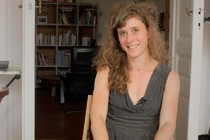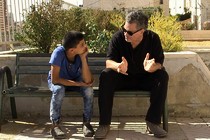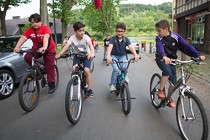Children of Chance: Childhood is already slipping away
by Fred Arends - Cinergie.be
- Thierry Michel and Pascal Colson’s moving documentary dives into the heart of a primary school class in a former mining town in Wallonia

After the success of The Man Who Mends Women [+see also:
trailer
film profile], Thierry Michel joins forces with Pascal Colson, a reporter and director of two short films, to direct Children of Chance [+see also:
trailer
film profile], a moving documentary which dives into the heart of a primary school class in a former mining town in Wallonia. Filmed over the course of one school year and addressing many different themes, this documentary portrait is both enthusiastic and optimistic.
This ‘dive’ is expressed from the outset by the opening shot of the film, in which an aerial camera approaches the astonishing surroundings; the ruins of the former coal mine impose themselves on the landscape, and on the nearby little school whose playground gradually draws the camera down towards it. Following this shot are the faces of the children to whom the documentary shall give the floor. These children will be the foundation of the documentary and the faces parading on the screen suggest surprising personalities, all very different despite their common origins.
The chance in the title refers to many things. Chance caused Thierry Michel to meet Brigitte Waroquier, teacher of years 5 and 6 in the little communal school with positive discrimination. The other ‘Chance’ is the name of the old coal mine opposite the school, known as ‘by Chance’, in Cheratte, in the Province of Liège. The mining site has been closed and abandoned since the 1970s. It is a reminder of the hard working life of those bygone days. The majority of the children who were filmed are of immigrant origin, and of the sixteen children in the class, fifteen have, or had, a grandfather from Turkey who left in order to escape poverty and who hoped, through the mining ‘dream’, to give his children a better future. Fifteen pupils are of Muslim faith, and just one attends the secular lessons on morality.
At the end of their primary school education, these children prepare to enter adulthood. No longer completely innocent, they speak freely and sometimes surprisingly, between very standard conversations and very personal ideas, expressed with the naivety and often acute intelligence of their age. Confronted by their teacher with sometimes difficult current topics, from the attacks in Brussels to bullying through social media, touching on wearing headscarves, the pupils respond with joyous aplomb and frankness. If this succession of themes is sometimes rushed, it also allows the expression of Muslim identity through children’s eyes and the ways in which they refer, or don’t refer, to their education. The directors also lead this class down the paths of the past and of their roots. One such touching moment is when they enter the mines with the old workers, their grandfathers.
Beyond these identity issues, the film is also a reflection of the learning process. At the end of the school year awaits either success or failure. If they obtain their Elementary Studies Certificate (CEB), the children will move on to secondary school. Guided by their kindly teacher, an incredible, cheeky and funny woman who fully embraces the film, they must already face the pressure of success and the demands of their parents. Childhood is already slipping away.
Produced by Les Films de la Passerelle, the film is sold abroad by Doc & Film International and distributed in Belgium by Le Parc Distribution.
In collaboration with
(Translated from French by Hannah Thompson)
Did you enjoy reading this article? Please subscribe to our newsletter to receive more stories like this directly in your inbox.





















